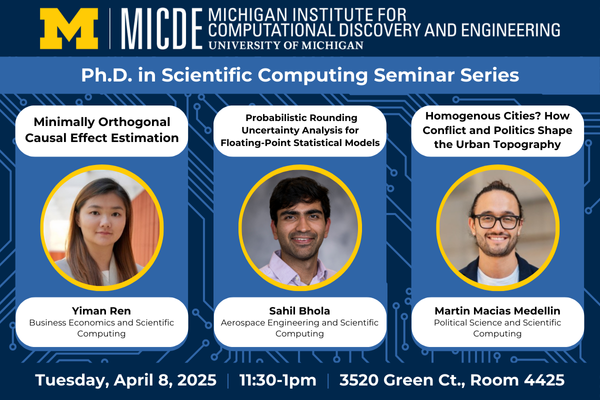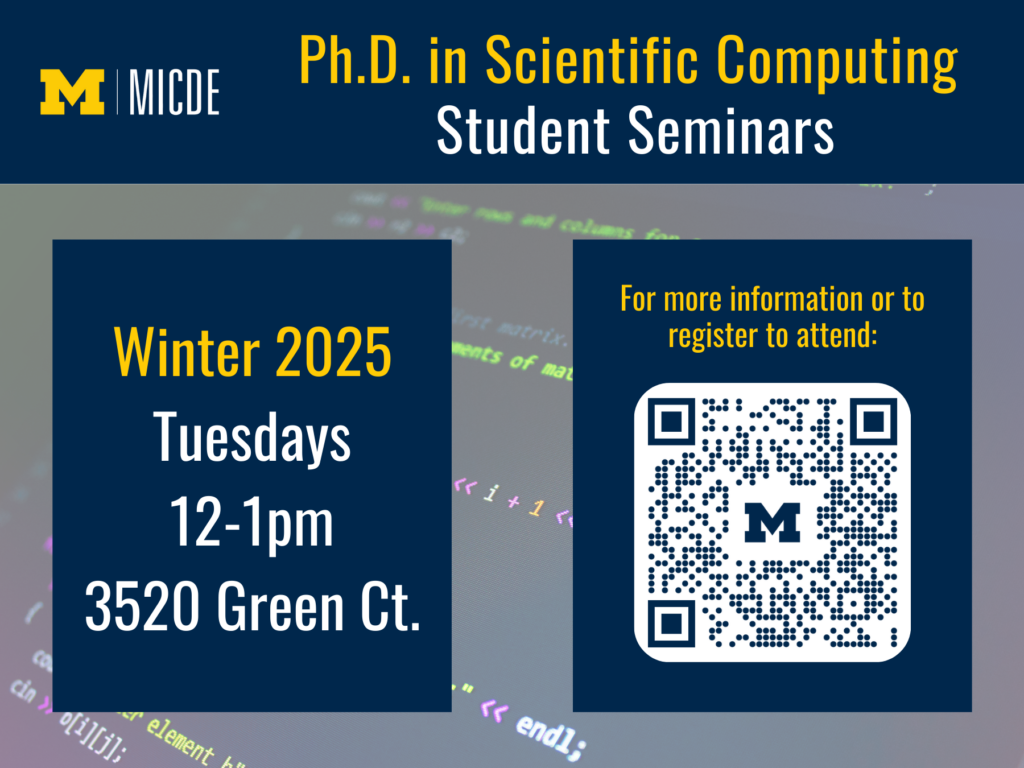Events

Ph.D. in Scientific Computing Student Seminars
April 8 @ 11:30 am - 1:00 pm
Venue: 4th floor conference room, Green Ct.

The MICDE PhD Student Seminar Series showcases the research of students in the Ph.D. in Scientific Computing. These events are open to the public, but we request that all who plan to attend register in advance.
Register to attend
Probabilistic Rounding Uncertainty Analysis for Floating-Point Statistical Models
Advancements in computer hardware now allow low- and mixed-precision arithmetic to improve efficiency, especially on new architectures. It is thus critical that the rounding uncertainty be rigorously quantified alongside traditional sources of uncertainty including those from observations, sampling, and numerical discretization. Traditional deterministic rounding uncertainty analysis (DBEA) assumes that the absolute rounding errors equal the unit roundoff u, considering the worst-case scenario. This work presents a novel probabilistic rounding uncertainty analysis called VIBEA. By treating rounding errors as i.i.d. random variables and leveraging concentration inequalities, VIBEA provides high-confidence estimates for rounding uncertainty using higher-order rounding error statistics. The presented framework is valid for all problem sizes n, unlike DBEA, which requires nu<1. Further, it can account for the potential cancellation of rounding errors, resulting in rounding uncertainty estimates that grow slowly with n. We demonstrate that quantifying rounding uncertainty alongside traditional sources allows for a more efficient allocation of computational resources, balancing efficiency with accuracy. This study takes a step towards a comprehensive mixed-precision approach to enhance model reliability and optimize resource allocation in predictive modeling. The talk will conclude with a vision for end-to-end, formally verified numerics for scientific computing.
Sahil Bhola, Aerospace Engineering and Scientific Computing
Sahil Bhola is a 4th-year Ph.D. candidate in Aerospace Engineering and Scientific Computing at the University of Michigan. He is a MICDE Fellow and a J.N. Tata Scholar, advised by Prof. Karthik Duraisamy. He holds a master’s degree in Aerospace Engineering from the University of Michigan and a bachelor’s degree in Mechanical Engineering from Thapar University, India. His research focuses on adaptive mixed-precision methods, experimental design for potential energy surfaces, and flow-based generative models for Bayesian inference.
Homogenous Cities? How Conflict and Politics Shape the Urban Topography
The relationship between armed conflict, politics, and the urban built environment
Martin Macias Medellin, Political Science
Martin Macias Medellin is interested in the dynamics of mass political dissent, political and criminal violence, and state-building processes. In his doctoral dissertation he studies how conflict affects the way in which cities are built and how the physical structures of urban areas affect the dynamics of armed conflict.
Minimally Orthogonal Causal Effect Estimation
Yiman Ren, Business Economics

